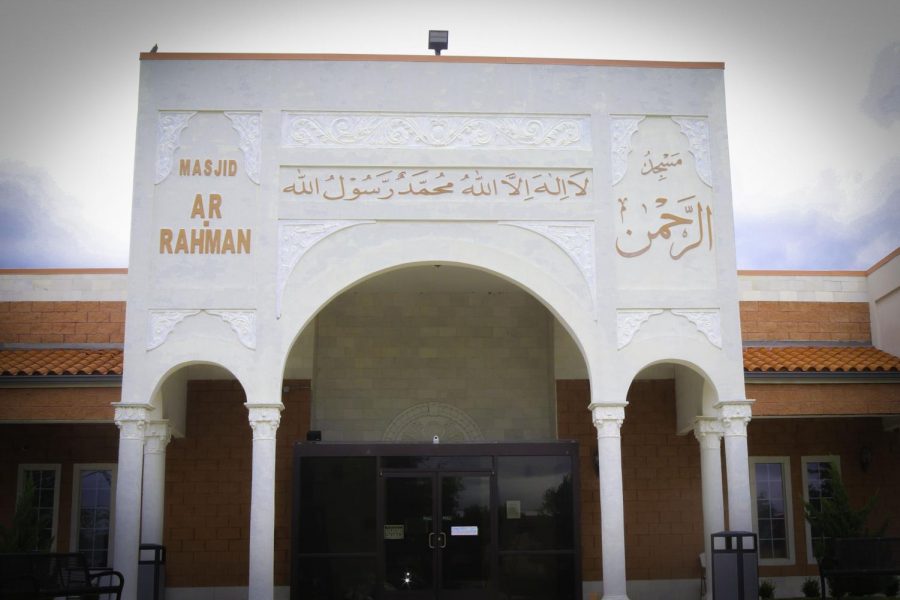How the Muslim community comes together for Ramadan
Islamic Association of Carrollton readies for Ramadan celebration.
May 12, 2021
The holy month of Ramadan is special, and for many Muslims, myself included, it is the time where we are the closest to God or Allah.
Ramadan first appeared in a verse in the Quran to Prophet Mohammed. Ramadan is a time of fasting that begins every day at dawn and ends when the sun sets. The purpose is to build a spiritual connection with Allah in addition to learning discipline or to focus on the real issues in the world.
FASTING
There are five pillars of Islam: fasting, profession of faith, prayer, giving, charity, and pilgrimage to Mecca. Most Muslims are required to fast, but exceptions are made for children, the elderly, pregnant women and those who are ill.
Fasting includes not eating any foods, drinking any liquids including medicines, smoking, chewing gum, and engaging in any sexual activity from sunrise to sunset. Watching TV and listening to music are limited in favor of listening to or reading the Quran more.
However, fasting is not the only feature of Ramadan. Giving to charity, performing a special prayer called Taraweeh, reading the Quran, and continuing the lifelong process of worship are also important aspects of the holy month.
When Ramadan is complete, a celebration is held called Eid al-Fitr, similar to Christmas in a way that everyone comes together. Family and friends have a big meal, gift money to kids and enjoy their time together. Despite the hardships of fasting for a whole month, Ramadan helps us to focus on personal growth as a way to better ourselves. Ramadan is unique in that it requires self-control from unhealthy habitats.
Muslims wake before sunrise to eat a meal called suhoor and break their fast at sundown to eat a meal referred to as iftar. Iftar is handled in different ways either with a portion of special food, by inviting guests or sharing food with neighbors.
THE ROLE OF PRAYER
The imam, a role similar to a priest, spreads the word of Allah to Muslims. During Ramadan, the role is heightened to provide Allah’s words and wisdom. The imam must organize nightly prayers called Taraweeh prayers. The prayers are held in mosques after everyone has finished their meal.
Imam Shpendim Nadzaku at the Richardson Mosque said he helps Muslims understand the true meaning behind the Quran and Islamic studies. He said he takes the role of imam very seriously. He said Taraweeh prayers changed a little because of the COVID-19 but were adapted quickly to provide for the Muslim community.
The imam said the most rewarding part for him is for Allah to be pleased with his work; blessing him, his family and community. He said entering Jannah, the Muslim concept of heaven, is the goal of life.
RAMADAN DATES
Ramadan’s date changes every year, and it can be traced back to the moon. The Islamic calendar follows the phases of the moon adding up to 354 days. The days are shorter than the standard calendar causing Ramadan to change every year.
There are organizations that partake in moonsighting to decide if Ramadan is 29 or 30 days. Shariah Board New York, a non-profit organization, serves the Muslim Unmah in their religious, spiritual, social and personal matters, according to sbny.org. Members arrange for local groups to participate in closely looking at the moon.
Shakilur Rahman Miah said Muslims look for Islamic hilal or the moon’s crescent, or the first visible sliver of the moon after its monthly birth on the 29th of every Islamic month. If it is sighted that night, the next day is the first day of Ramadan. Otherwise, the next day will be the 30th. Looking for the crescent comes from the Quran and Hadith making moon sighting as important as other acts of worship, such as Zakat, Hajj and Ramadan. This tradition of determining Ramadan with a naked eye has been going on for 14 centuries.
COVID-19 IMPACT
Last year with COVID-19 and the lockdown, the traditions Muslims follow during Ramadan were disturbed. Muslim essential workers on the frontlines not only fasted but focused on ways to quarantine safely.
According to an article in Vice, Muslim essential workers worried daily about spreading the virus to loved ones when returning home from work, and about staying physically and mentally strong to fulfill the duties of their job while not being able to drink water and eat food.
Dr. Hasan Shanawani, board chairman of American Muslim Health Professionals said Muslim health professionals are on the clock 24/7 and even if it’s Ramadan health professionals have to take care of patients.
Hazem Tabahi, vice-president of Pita Inn Chain in Chicago, said in the Islamic Networks Group panel discussion, Muslim restaurants took large portions of food to distribute to mosques and organizations that are feeding those who are less fortunate.
HOW TO PARTICIPATE
Often those who are around Muslims forget they are fasting. Non-Muslims can be respectful by not offering a bite of food or a sip of a drink. Most Muslims are not asking for their friends and coworkers to fast along with them out of solidarity. However, to help those fasting, non-Muslims can ask simple questions such as how their fasting is going and what recipes they are excited to try for iftar.
Contacting a local mosque and volunteering to participate in serving iftar is another way to help. Ramadan is a bridge that can connect Muslims and non-Muslims.


